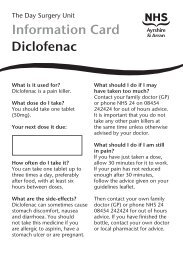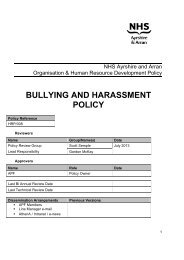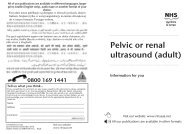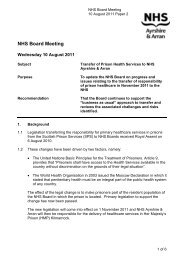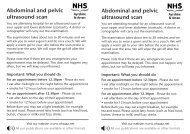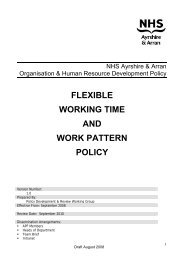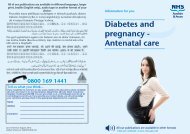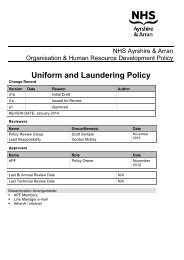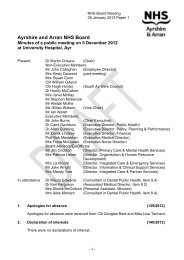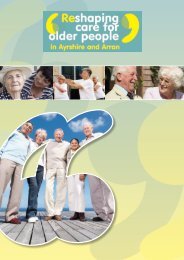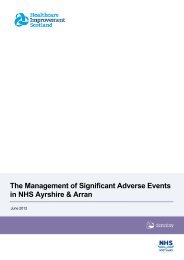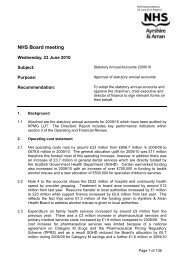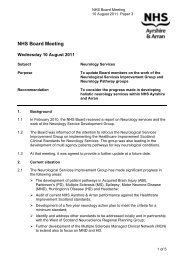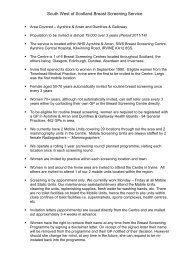Paper 06 - NHS Ayrshire and Arran.
Paper 06 - NHS Ayrshire and Arran.
Paper 06 - NHS Ayrshire and Arran.
You also want an ePaper? Increase the reach of your titles
YUMPU automatically turns print PDFs into web optimized ePapers that Google loves.
The results in the test site at Crosshouse have improved dramatically as the test<br />
site is enriched due to the fact that there is a pharmacist in this area who<br />
undertakes the reconciliation of medicines. The reconciliation process at Ayr<br />
continues to be unreliable with signs of deterioration. Clinical leads are working<br />
hard to identify issues, develop solutions <strong>and</strong> have identified that the Emergency<br />
Care Summary (ECS) may present part of the solution.<br />
The ECS is a summary of basic information about the patients health which might<br />
be important when the patient needs urgent medical care when the General<br />
Practitioner’s (GPs) surgery is closed, or when the patient goes to an Accident <strong>and</strong><br />
Emergency (A&E) department. The summary provides information regarding<br />
current medication that has been prescribed by a patient’s GP <strong>and</strong> can act as one<br />
of the two sources required for MR.<br />
Currently the trainee doctors do not all access the ECS, making MR much more<br />
difficult. The reasons for the lack of access by trainees are; ECS access is given no<br />
priority in relation to medical induction <strong>and</strong> there is a subsequent poor uptake of<br />
ECS training which must be undertaken to use the system; junior medical staff are<br />
a rotational work force. They require to be trained <strong>and</strong> given passwords for ECS<br />
when they enter employment with <strong>NHS</strong> <strong>Ayrshire</strong> <strong>and</strong> <strong>Arran</strong>. This is irrespective of<br />
previous training <strong>and</strong> access in other Scottish Health Boards.<br />
2.5 Safety Culture Work<br />
Staff working with Maternity Services were asked to complete the Pascal Metrics<br />
Safety Attitudes Questionnaire (SAQ). The SAQ is a psychometrically validated<br />
tool for measuring patient safety culture using seven dimensions; teamwork<br />
climate; safety climate; job satisfaction; stress recognition; working conditions;<br />
perceptions of senior management <strong>and</strong> perception of local management.<br />
In line with Pascal Metrics methodology, maternity staff were grouped into nine<br />
distinct cohorts of staff who worked together in a work setting The safety culture<br />
survey has now been completed for the maternity unit with a response rate of 62%.<br />
Initial feedback has been delivered to over 200 staff by Michael Leonard of Pascal<br />
Metrics.<br />
Senior clinical leaders from the organisation have participated in a 2 day<br />
conference with Pascal Metrics <strong>and</strong> senior leaders throughout the United Kingdom<br />
to better underst<strong>and</strong> the survey, how to brief staff of the results for their area <strong>and</strong><br />
how to identify safety issues <strong>and</strong> develop improvement plans.<br />
3. Proposal<br />
3.1 To continue with the ‘suite’ of actions outlined in this report <strong>and</strong> maintain<br />
momentum <strong>and</strong> clinical engagement in relation to reduction of HSMR. Progress will<br />
continue to be monitored <strong>and</strong> the data will be used to identify when the<br />
interventions made have resulted in improvement <strong>and</strong> to allow improvement work<br />
to be refocused as required to meet the target of a decrease of 30% by 2012. The<br />
HSMR Steering Groups <strong>and</strong> CCIB will to continue to determine actions to support<br />
the meeting of these targets.<br />
8 of 10



